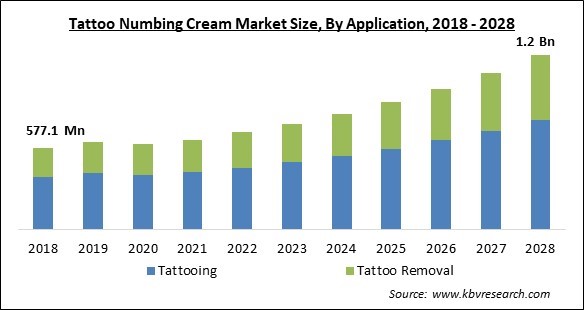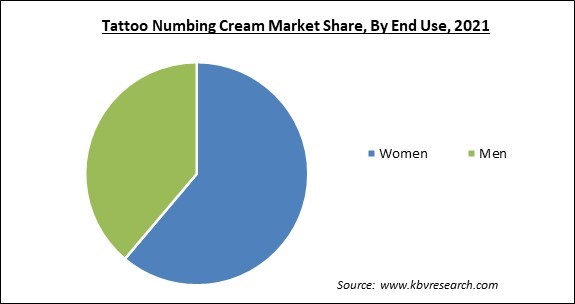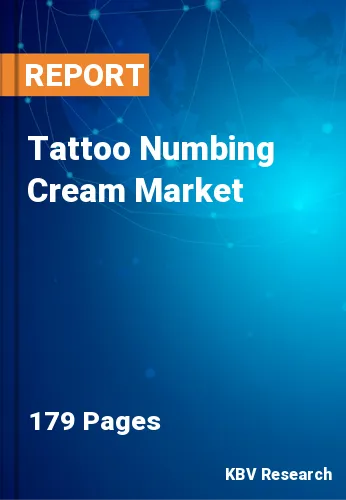The Global Tattoo Numbing Cream Market size is expected to reach $1.2 billion by 2028, rising at a market growth of 10.2% CAGR during the forecast period.
Tattoo numbing creams are medications that lessen the pain sensitivity during the tattooing and tattoo removal processes and functions similarly to a local anesthetic. These creams work by blocking nerve signals transmission in the body. Most tattoo numbing creams are topically applicable. After tattooing, the tattoo numbing cream's anesthetic effects usually last 2–6 hours. The sensation gradually starts to return to the tattooed site after that.

Beyond tattoos, tattoo numbing creams can also be employed for a variety of applications. They are also widely used for piercing, waxing, and other hair removal procedures. In addition, numerous tattoo-numbing lotions are easily accessible online, over the counter, and with a prescription. The most typical components in most numbing creams are lidocaine, benzocaine, tetracaine, and occasionally epinephrine.
They function by preventing pain signals from being sent by the skin's nerve receptors, which anesthetizes the location where the cream is administered. For the vast majority of users, these creams are efficient in blocking out pain during these processes. Another advantage of utilizing a numbing cream is the ability to sit still for an extended period without having to take breaks, stop the tattoo artist in mid-process, or divide the tattooing into many sessions.
Lidocaine, which can prevent nerves from transmitting signals to the brain in order to produce a loss of feeling in the skin and a numbing effect, is the most crucial active ingredient in most tattoo numbing creams. Lidocaine is perfect for tattoos since it just affects the region where it is applied. Lidocaine is a widely used topical anesthetic with FDA approval for reducing pain during tattooing and operations like microblading and tattoo removal. In addition, Lidocaine is a simple, safe, and efficient numbing drug.
Significant changes have been made in recent years to support artists in the face of the COVID-19 pandemic. In the midst of and after the COVID-19 issue, tattoo studios are expected to place a strong emphasis on hygiene by using disposable equipment parts, disinfectants, and protective plastic covers in their facilities. Still, many manufacturers could grow as a result of the retail stores' closure since they were able to rapidly switch to online platforms. To further increase online sales during the outbreak, companies in the cosmetics sector streamlined their supply chains. Additionally, a boost in product sales occurred when stores opened.
The market for tattoo numbing cream is expanding due to the increase of spa clinics and tattoo studios. The increase of spa clinics and tattoo studios that provide body piercing services is fueling the desire for body art on a wide scale. Additionally, the number of tattooists proficiently offering high-fashion solutions like body art or tattoos and body piercing removal services is growing, contributing to the rise in the popularity of tattoo industry around the world. As a result, these variables are generating several chances for the major market participants in tattoo numbing cream internationally. Such factors are propelling the growth of the tattoo numbing cream market.
Lasers may remove tattoos by dispersing the pigment hues with a strong light beam. As all laser wavelengths are absorbed by black tattoo pigment, it is the most straightforward color to remove. Based on the pigment color, certain lasers can only treat other colors. Yellow, green, and bright tattoo colors are more difficult to remove than deeper blacks and blues. These colors present a greater challenge since their absorption spectra are outside or close to the limits of the emission spectra offered by the laser tattoo removal system being employed. Therefore, as the demand for laser tattoo removal increases, it aids in expanding the market.
The biggest issue with many tattoo numbing creams available nowadays is that they take time to work. Numerous numbing creams must be applied approximately 30 to 45 minutes before the procedure. Most medical professionals advise patients to use the cream at home before their appointment because of this. Unfortunately, only a few topical anesthetics have administration mechanisms that enable a quicker onset and a longer duration. Additionally, the unawareness of such products in many places further reduces the chances of growth. As a result, many still use traditional pain coping methods like ice packs, cold air machines, lidocaine injections, etc. These factors deter a substantial number of people from getting tattoos, which restrains the growth of the tattoo numbing cream market.
Based on application, the tattoo numbing cream market is categorized into tattooing and tattoo removal. The tattooing segment garnered the highest revenue share in the tattoo numbing cream market in 2021. The need for tattoo numbing cream is rising as the popularity of getting tattoos rises. Young people's propensity for getting tattoos is a major factor behind the segment's expansion. As times have changed, so have opinions on tattoos in the workplace. People get tattoos for a variety of reasons, including artistic, cosmetic, religious, sentimental/memorial, and spiritual ones.

On the basis of end use, the tattoo numbing cream market is divided into men and women. The men segment recorded a significant revenue share in the tattoo numbing cream market in 2021. Men have shown a considerable increase in demand for tattooing in recent years and hence are credited with the segment's growth. Men frequently choose tattoos on their shoulders, biceps, and forearms. In many cultures, religious beliefs can have an impact on where and how males get tattoos. Tattoos are widely seen as a highly positive form of self-expression. The rising trend of getting larger tattoos has also seen more male participation.
Based on distribution channel, the tattoo numbing cream market is segmented into online and offline. The offline segment witnessed the maximum revenue share in the tattoo numbing cream market in 2021. Manufacturers prioritize offline sales due to their ongoing efforts to improve their items' exposure on store shelves. In addition, since most people prefer to get tattoos in tattoo studios, a larger product exposure can be achieved through sales from these stores. As a result, there are more offline options for skin care items like tattoo numbing creams. Such elements are driving the tattoo numbing cream market's offline sector.
| Report Attribute | Details |
|---|---|
| Market size value in 2021 | USD 631.9 Million |
| Market size forecast in 2028 | USD 1.2 Billion |
| Base Year | 2021 |
| Historical Period | 2018 to 2020 |
| Forecast Period | 2022 to 2028 |
| Revenue Growth Rate | CAGR of 10.2% from 2022 to 2028 |
| Number of Pages | 179 |
| Number of Tables | 317 |
| Report coverage | Market Trends, Revenue Estimation and Forecast, Segmentation Analysis, Regional and Country Breakdown, Companies Strategic Developments, Company Profiling |
| Segments covered | Application, Distribution Channel, End Use, Region |
| Country scope | US, Canada, Mexico, Germany, UK, France, Russia, Spain, Italy, China, Japan, India, South Korea, Singapore, Malaysia, Brazil, Argentina, UAE, Saudi Arabia, South Africa, Nigeria |
| Growth Drivers |
|
| Restraints |
|
On the basis of region, the tattoo numbing cream market is analyzed across North America, Europe, Asia Pacific, and LAMEA. The North America segment recorded the largest revenue share in the tattoo numbing cream market in 2021. The market has grown as a result of the expanding tattoo culture in the region. The growth is also attributable to the increase in customer awareness of the variety of aesthetic and therapeutic body art options outside of the traditional variations. Additionally, consumer knowledge of the availability of diverse aesthetic and medicinal body art outside the conventional varieties is growing in the region.
Free Valuable Insights: Global Tattoo Numbing Cream Market size to reach USD 1.2 Billion by 2028
The market research report covers the analysis of key stake holders of the market. Key companies profiled in the report include Aspen Pharmacare Australia Pty Ltd. (Aspen Pharmacare Holdings Limited), TattooNumbX, Centaur Pharmaceuticals Pvt. Ltd., Zensa Skin Care, Hera Beauty Ltd., Dr. Numb (Shinpharma Inc.), and Tattoo Numbing Cream Co.
By Application
By End Use
By Distribution Channel
By Geography
The global Tattoo Numbing Cream Market size is expected to reach $1.2 billion by 2028.
An increasing number of SPA clinics and tattoo studios are driving the market in coming years, however, Need for longer breaks between cream application and procedure, along with commonly available alternatives restraints the growth of the market.
Aspen Pharmacare Australia Pty Ltd. (Aspen Pharmacare Holdings Limited), TattooNumbX, Centaur Pharmaceuticals Pvt. Ltd., Zensa Skin Care, Hera Beauty Ltd., Dr. Numb (Shinpharma Inc.), and Tattoo Numbing Cream Co.
The expected CAGR of the Tattoo Numbing Cream Market is 10.2% from 2022 to 2028.
The Women segment acquired maximum revenue share in the Global Tattoo Numbing Cream Market by End Use in 2021 thereby, achieving a market value of $736.7 Million by 2028.
The North America market dominated the Global Tattoo Numbing Cream Market by Region in 2021, and would continue to be a dominant market till 2028; thereby, achieving a market value of $416.9 Million by 2028.
Our team of dedicated experts can provide you with attractive expansion opportunities for your business.

